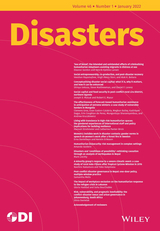
Humanitarians' ethics: the role of face-to-face experiences for humanitarian aid workers' motivation
Friesen, InaExternal Publications (2023)
in: Disasters 47 (1), 23-41
DOI: https://doi.org/10.1111/disa.12531
Open access
This paper analyses the significance of specific ethical experiences for humanitarian aid workers' motivation. Following Emmanuel Levinas's understanding of ethics as arising from intersubjective face-to-face encounters, the study illuminates the experiential origins of the humanitarian commitment by analysing James Orbinski's memoir entitled An Imperfect Offering: Dispatches from the Medical Frontline. Orbinski, a former International Council President at Médecins Sans Frontières, was directly involved in humanitarian responses to several major crises during the 1990s, including those in Somalia, Afghanistan, Rwanda, and what was then Zaire. This paper explores three formative experiences from Orbinski's childhood and teenage years to analyse the personal ethics of humanitarian aid workers and to illuminate the intersection of the personal and professional level of humanitarian aid work. Illustrating that Orbinski's humanitarian commitment is a surrendering to the other's call, the paper argues for stronger inclusion of aid workers' lives and experiences to achieve a comprehensive understanding of humanitarian work.

